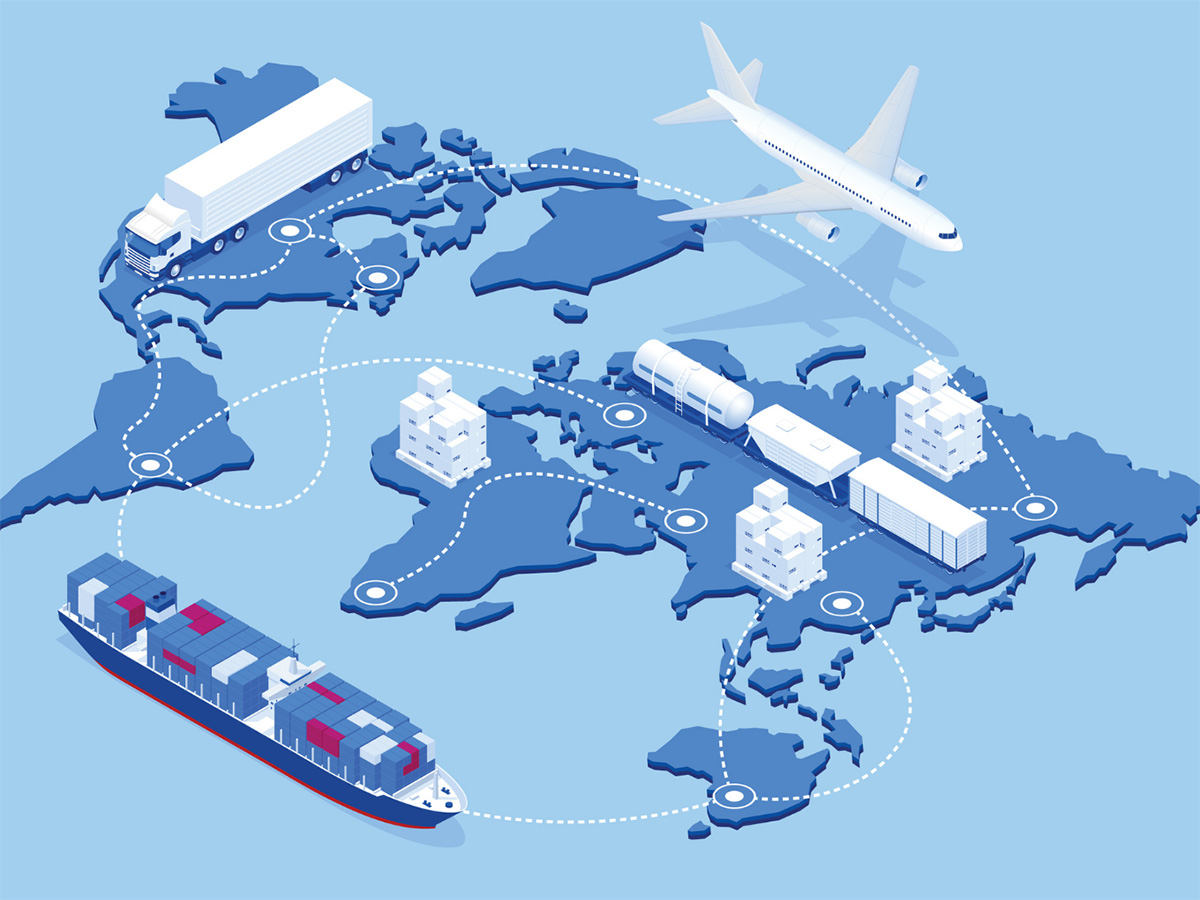

Finance
What Is RFID In Supply Chain Management?
Modified: December 29, 2023
Learn how RFID technology is revolutionizing supply chain management in the finance industry, enhancing inventory tracking, reducing costs, and improving operational efficiency.
(Many of the links in this article redirect to a specific reviewed product. Your purchase of these products through affiliate links helps to generate commission for LiveWell, at no extra cost. Learn more)
Table of Contents
- Introduction
- Definition of RFID
- Benefits of RFID in Supply Chain Management
- Applications of RFID in Supply Chain Management
- Implementation of RFID in Supply Chain Management
- Challenges and Limitations of RFID in Supply Chain Management
- Case Studies of RFID Implementation in Supply Chain Management
- Future Trends and Innovations in RFID for Supply Chain Management
- Conclusion
Introduction
In the evolving landscape of supply chain management, businesses are constantly seeking innovative technologies to streamline operations, enhance efficiency, and gain a competitive edge. One such technology that has gained significant traction in recent years is Radio Frequency Identification (RFID). RFID technology revolutionizes supply chain management by enabling real-time tracking, visibility, and monitoring of assets throughout the entire supply chain.
RFID is a wireless technology that uses radio frequency waves to identify and track objects equipped with RFID tags or labels. These tags contain digital information that can be read by RFID readers or scanners, allowing for quick and accurate identification of items.
The implementation of RFID in supply chain management offers a wide range of benefits, from improving inventory accuracy and reducing stockouts to increasing operational efficiency and enhancing customer satisfaction. With the ability to automate data capture and provide real-time visibility, RFID technology helps organizations optimize their supply chain processes and make informed decisions.
In this article, we will delve into the world of RFID in supply chain management, exploring its definition, benefits, applications, implementation, challenges, and future trends.
Definition of RFID
Radio Frequency Identification (RFID) is a technology that uses radio frequency waves to automatically identify and track objects. It consists of two components: RFID tags and RFID readers. RFID tags, also known as transponders, are small electronic devices equipped with a microchip and an antenna. These tags are attached or embedded into objects, such as products or assets, to uniquely identify them.
RFID readers, on the other hand, are devices that emit radio frequency waves and capture the information stored in the RFID tags. The reader communicates with the tags wirelessly, without the need for direct line-of-sight or physical contact. When an RFID tag comes within the range of an RFID reader, it activates and sends its unique identification data to the reader. The reader then captures this data, which can be used for various purposes, such as inventory management, asset tracking, and supply chain optimization.
There are different types of RFID tags, including passive, active, and semi-passive tags. Passive tags do not have an internal power source and rely on the energy emitted by the RFID reader to power the tag and transmit data. Active tags, on the other hand, have their own power source and are capable of actively transmitting data. Semi-passive tags have an internal power source to power the chip but rely on the RFID reader for communication.
RFID technology offers several advantages over traditional barcode systems. Unlike barcodes, which require line-of-sight scanning, RFID enables non-contact, bulk scanning of multiple tags simultaneously. This allows for faster and more efficient data capture. Additionally, RFID tags can store more information than barcodes and can be read from longer distances, making them ideal for tracking assets and inventory in large-scale operations.
In summary, RFID is a wireless technology that uses radio frequency waves to identify and track objects through the use of RFID tags and readers. By providing real-time visibility and automation in data capture, RFID enhances supply chain management and contributes to improved efficiency and accuracy in various industries.
Benefits of RFID in Supply Chain Management
RFID technology has transformed the way supply chains operate, offering numerous benefits that enhance efficiency, visibility, and overall performance. Here are some key advantages of implementing RFID in supply chain management:
- Real-time Inventory Management: RFID enables real-time tracking of inventory levels and locations. With RFID tags attached to products, businesses can accurately monitor stock levels, automate inventory counts, and minimize stockouts and overstocking. This real-time visibility allows for better demand forecasting and optimized inventory management.
- Improved Operational Efficiency: RFID technology automates data capture, eliminating the need for manual scanning or data entry. This streamlines processes, reduces human error, and saves time and labor costs. RFID also enables faster receiving, picking, and shipping processes, resulting in improved operational efficiency and faster order fulfillment.
- Enhanced Supply Chain Visibility: RFID provides end-to-end visibility of products and assets throughout the supply chain. With RFID readers installed at key checkpoints, businesses can track the movement of goods, monitor delivery times, and identify bottlenecks or delays in real-time. This visibility enables proactive decision-making, quicker problem resolution, and improved customer service.
- Reduction in Loss and Theft: RFID tags can be used to implement anti-theft measures within the supply chain. By tracking and monitoring the movement of goods, businesses can identify any unauthorized handling or potential theft. This helps in reducing losses and improving overall security.
- Enhanced Product Authentication: RFID tags can be equipped with additional security features, such as encryption or unique authentication codes. This helps in detecting counterfeit products, ensuring product integrity, and safeguarding brand reputation.
- Improved Traceability and Recall Management: In industries such as food and pharmaceuticals, traceability is crucial. RFID technology enables the tracing of products back to their origin, facilitating faster and more accurate recall management. In the event of a product recall, businesses can quickly identify affected products and take appropriate actions.
Overall, the implementation of RFID in supply chain management offers significant benefits in terms of inventory management, operational efficiency, visibility, security, and traceability. By leveraging RFID technology, businesses can optimize their supply chain processes, reduce costs, and deliver exceptional customer service.
Applications of RFID in Supply Chain Management
RFID technology has a wide range of applications in supply chain management, transforming traditional processes and providing new possibilities for efficient operations. Here are some key applications of RFID in supply chain management:
- Inventory Management: RFID enables efficient and accurate inventory management. By attaching RFID tags to products, businesses can automatically track and update inventory levels in real-time. This allows for improved visibility, reduced stockouts, and optimized replenishment processes.
- Warehouse Management: RFID enhances warehouse operations by automating processes such as receiving, put-away, picking, and shipping. RFID tags on products can be automatically scanned as they move through different stages of warehouse operations, reducing manual labor, minimizing errors, and improving overall efficiency.
- Asset Tracking: RFID technology enables organizations to track and manage their assets throughout the supply chain. This includes equipment, vehicles, containers, and other valuable resources. By using RFID tags on assets, companies can easily locate and monitor their assets in real-time, ensuring maximum utilization and minimizing losses or theft.
- Cold Chain Management: In industries such as food and pharmaceuticals, maintaining the integrity of temperature-sensitive products is critical. RFID tags with temperature sensors can be used to monitor and track products within the cold chain, ensuring compliance with regulatory requirements and minimizing spoilage or quality issues.
- Returns Management: Handling product returns can be a complex process. RFID technology simplifies returns management by allowing businesses to quickly identify and process returned items. By scanning the RFID tags, companies can verify product authenticity, check for any damages, and efficiently update inventory records.
- Supply Chain Visibility: RFID provides end-to-end visibility of goods throughout the supply chain. By strategically placing RFID readers at key checkpoints, businesses can track the movement of products, monitor delivery times, and identify any bottlenecks or delays. This visibility enables proactive decision-making, improving overall supply chain performance.
These applications of RFID in supply chain management demonstrate how the technology can revolutionize traditional processes, provide real-time visibility, and optimize operations. By leveraging RFID technology, businesses can achieve greater efficiency, accuracy, and customer satisfaction in their supply chain management practices.
Implementation of RFID in Supply Chain Management
The successful implementation of RFID in supply chain management requires careful planning, strategic implementation, and integration with existing systems. Here are the key steps involved in implementing RFID technology:
- Define Objectives: Start by identifying the specific goals and objectives for implementing RFID technology in your supply chain. This could include improving inventory accuracy, reducing labor costs, enhancing visibility, or streamlining operations.
- Assess Readiness: Evaluate your organization’s readiness for RFID implementation. This involves examining your current infrastructure, processes, and resources. Consider factors such as IT capabilities, system integration requirements, and staff training needs.
- Tag Selection: Choose the appropriate RFID tag based on your specific requirements. Consider factors such as tag type (passive, active, semi-passive), read range, durability, and cost. Select tags that are compatible with your products and operating environment.
- Reader and Infrastructure Setup: Determine the number and placement of RFID readers within your facility. Consider factors such as coverage area, read range, and interference. Install the necessary infrastructure, such as antennas and network connections, to support RFID communication.
- Tagging Strategy: Develop a tagging strategy based on your supply chain processes. Determine which items or assets will be tagged and at what stage of the supply chain. Consider factors such as the volume of items, tagging costs, and ease of application.
- Integration with Existing Systems: Integrate RFID data with your existing supply chain management systems, such as inventory management, warehouse management, and enterprise resource planning (ERP) systems. This integration ensures seamless data flow and enables real-time visibility and decision-making.
- Training and Change Management: Provide training to your staff on how to use and interpret RFID data. Communicate the benefits of RFID implementation and explain the changes in workflows and processes. Engage employees throughout the implementation process to foster acceptance and adoption.
- Pilot Testing and Optimization: Conduct pilot tests to validate the RFID system’s performance and address any issues or gaps. Optimize the system based on feedback and lessons learned from the pilot implementation. Make necessary adjustments to ensure the system meets your specific requirements.
- Scale-up and Continuous Improvement: Once the pilot testing is successful, roll out the RFID system across your supply chain operations. Monitor the system’s performance and gather feedback to identify areas for improvement. Continuously optimize the RFID implementation to achieve maximum benefits.
Implementing RFID technology in supply chain management requires a systematic approach to ensure a smooth transition and maximize the benefits. By following these steps and collaborating with RFID solution providers, businesses can unlock the full potential of RFID technology in optimizing their supply chain operations.
Challenges and Limitations of RFID in Supply Chain Management
While RFID technology offers significant benefits in supply chain management, it also presents certain challenges and limitations that need to be addressed. Here are some of the key challenges and limitations of implementing RFID in supply chain management:
- Cost: RFID implementation can be costly, especially when considering the initial investment in tags, readers, and infrastructure. The cost of tags can vary based on the type and volume required, adding to the overall implementation expenses. However, as RFID technology continues to advance and gain wider adoption, costs are gradually decreasing.
- Complexity: Implementing RFID technology requires expertise in deploying and integrating the system with existing supply chain management processes and systems. The complexity involved in setting up RFID infrastructure, configuring readers, and managing data can pose challenges for organizations, necessitating careful planning and technical know-how.
- Interference and Readability: RFID signals can be affected by environmental factors, such as metal or liquids, which can interfere with signal strength and readability. This can lead to missed reads or inaccurate data capture, impacting the reliability of the system. It is crucial to consider the operating environment and potential sources of interference during the RFID implementation.
- Range and Read Speed: The read range and speed of RFID technology can vary based on factors such as tag type and reader capabilities. Depending on the application, the limited read range of passive RFID tags may require installing multiple readers to ensure complete coverage. Additionally, crowded environments or high-speed operations can pose challenges in achieving fast and accurate reads.
- Data Management: RFID technology generates large volumes of data, which can be overwhelming to manage and analyze. Businesses need robust data management systems to handle the influx of real-time data and extract meaningful insights. Integrating RFID data with existing supply chain management systems can also be a complex task, requiring careful synchronization and data integration.
- Privacy and Security: RFID tags can store sensitive information about products, assets, or customers. Ensuring the privacy and security of this data is vital to protect against unauthorized access or misuse. Businesses must implement appropriate data security measures, such as encryption and access controls, to safeguard RFID data from potential threats.
While these challenges and limitations exist, technological advancements and industry standards continue to address many of these issues. As RFID technology evolves, organizations can expect improved performance, reduced costs, and enhanced capabilities, making it a valuable tool in optimizing supply chain management.
Case Studies of RFID Implementation in Supply Chain Management
Several companies across various industries have successfully implemented RFID technology in their supply chain management processes. Let’s explore a few notable case studies:
1. Walmart: Retail giant Walmart implemented RFID technology to improve inventory management and supply chain visibility. By tagging products with RFID tags, Walmart gained real-time visibility into their inventory, reducing out-of-stock situations and improving replenishment processes. The RFID implementation allowed them to track products from their distribution centers to the store shelves, enabling better demand planning and improving overall operational efficiency.
2. DHL: DHL, a global logistics company, implemented RFID technology to enhance warehouse operations. By using RFID tags on pallets and packages, DHL achieved more accurate and efficient tracking of inventory. The RFID system enabled automated scanning and processing of shipments, reducing manual handling and improving picking and shipping processes. This led to faster order fulfillment, increased productivity, and improved customer satisfaction.
3. Zara: The fast-fashion retailer, Zara, implemented RFID technology to improve inventory accuracy and promote seamless customer experiences. RFID tags were attached to garments, enabling accurate and real-time inventory tracking throughout the supply chain. This allowed Zara to expedite stock replenishment, optimize store layouts, and ensure accurate stock counts. By leveraging RFID in their supply chain management, Zara achieved inventory accuracy of over 98% and improved the overall efficiency of their operations.
4. Airbus: Airbus, the aerospace manufacturer, implemented RFID technology in its aircraft production and supply chain processes. RFID tags were used to track aircraft parts and components, ensuring their proper handling and maintenance throughout the manufacturing and assembly processes. The RFID system provided Airbus with real-time visibility into the location and status of each part, reducing errors, improving traceability, and enhancing efficiency in their supply chain operations.
5. Coca-Cola: Coca-Cola implemented RFID technology to optimize their distribution and delivery processes. By attaching RFID tags to product cases and pallets, Coca-Cola achieved better visibility and control over their inventory in transit. This enabled efficient route planning, improved delivery accuracy, and reduced delivery time. The RFID implementation helped Coca-Cola streamline their supply chain and enhance customer satisfaction by ensuring on-time and accurate product availability.
These case studies demonstrate the successful implementation of RFID technology in supply chain management across diverse industries. By leveraging RFID, these companies have achieved improved inventory accuracy, enhanced operational efficiency, better visibility, and streamlined processes, ultimately leading to increased customer satisfaction and a competitive advantage in the marketplace.
Future Trends and Innovations in RFID for Supply Chain Management
The future of RFID technology in supply chain management holds exciting possibilities for further optimization and improvement. Here are some emerging trends and innovations to watch out for:
- Internet of Things (IoT) Integration: The integration of RFID with IoT devices and sensors will enable enhanced connectivity and data exchange in the supply chain. This will allow for more advanced tracking and monitoring capabilities, such as real-time temperature and humidity monitoring for perishable goods, or condition monitoring for high-value assets.
- Blockchain Integration: Integrating RFID data with blockchain technology can enhance transparency and trust in supply chain management. Blockchain can provide an immutable and auditable record of all RFID-related transactions, ensuring data integrity, traceability, and secure sharing of information across stakeholders.
- Miniaturization and Cost Reduction: RFID technology is becoming more compact and cost-effective. Smaller, low-cost RFID tags with improved capabilities will enable wider adoption in various industries and applications.
- Enhanced Tag Performance: Ongoing research and development are focused on improving the read range, read speed, and reliability of RFID tags. Innovations in tag design, materials, and manufacturing processes will lead to better performance, especially in challenging environments.
- AI and Analytics: The integration of artificial intelligence (AI) algorithms and advanced analytics with RFID data will unlock valuable insights and predictive capabilities in supply chain management. AI-powered analytics can help identify patterns, optimize routing and scheduling, predict demand, and detect anomalies in real-time.
- Energy Harvesting: Advancements in energy-harvesting techniques will enable RFID tags to power themselves using ambient energy sources, eliminating the need for batteries. This will enhance the lifespan and sustainability of RFID deployments while reducing maintenance and operational costs.
- Mobile and Handheld Solutions: The advancement of mobile and handheld RFID readers and devices will enable more flexible and mobile data capture in supply chain operations. This will empower workers to easily scan and capture RFID data on the go, providing real-time updates and improving efficiency.
These future trends and innovations in RFID technology demonstrate the potential for further optimization and advancements in supply chain management. By embracing these emerging trends, businesses can enhance visibility, improve decision-making, and achieve greater efficiency and agility in their supply chain operations.
Conclusion
RFID technology in supply chain management has revolutionized the way businesses operate, offering enhanced visibility, accuracy, and efficiency throughout the supply chain. By implementing RFID, organizations can improve inventory management, streamline processes, reduce costs, and deliver exceptional customer experiences.
From real-time inventory tracking to improved operational efficiency to enhanced supply chain visibility, RFID provides a wide range of benefits. It facilitates real-time data capture, automates processes, and enables informed decision-making. With RFID, businesses can optimize their supply chain operations, reduce stockouts, prevent loss or theft, and ensure the integrity of products.
However, implementing RFID in supply chain management does come with its challenges and limitations, such as cost considerations, complexity, and potential interference. These challenges require careful planning, expertise, and collaboration with RFID solution providers to ensure a successful implementation.
Looking towards the future, emerging trends and innovations in RFID technology, including IoT integration, blockchain integration, miniaturization, and enhanced tag performance, will continue to drive advancements in supply chain management. The integration of AI and analytics, energy harvesting techniques, and mobile solutions will further improve efficiency and effectiveness in supply chain operations.
In conclusion, RFID technology offers immense potential to optimize supply chain management and drive business success. By strategically implementing and harnessing the power of RFID, organizations can unlock new levels of efficiency, visibility, and agility in their supply chain operations, ultimately providing a competitive edge in an ever-evolving global market.














